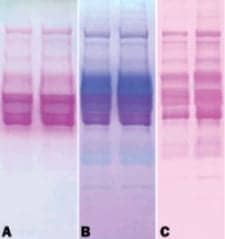Summary: Researchers from the University of Central Florida have developed a highly sensitive plasmonic biosensor capable of detecting dopamine directly from unprocessed blood, offering a low-cost tool for screening cancers and neurological conditions.
Takeaways:
- The newly developed plasmonic biosensor can detect dopamine directly from blood samples without preparation, simplifying the diagnostic process for neurological conditions and certain cancers.
- The sensor uses an aptamer-based detection method, making it cost-effective, easy to store, and applicable in areas with limited medical resources.
- This breakthrough opens the door to developing versatile diagnostic tools for various biomolecules, enabling rapid disease monitoring and targeted therapies in global healthcare.
Dopamine, a neurotransmitter in our brains, not only regulates our emotions but also serves as a biomarker for the screening of certain cancers and other neurological conditions.
University of Central Florida researchers, led by UCF NanoScience Technology Center Professor Debashis Chanda, have developed an integrated optical sensor capable of detecting dopamine directly from an unprocessed blood sample. This sensor may serve as a low-cost and efficient screening tool for various neurological conditions and cancers, ultimately providing better outcomes for patients.
The study was funded by the U.S. National Science Foundation and was published in Science Advances.
“This plasmonic biosensor is extremely sensitive to low concentrations of biomolecules, which make them promising platform for specialized assays, point of care applications in remote locations,” says Chanda, the study’s principal investigator who also has appointments in UCF’s Department of Physics and CREOL, the College of Optics and Photonics. “In this work, we demonstrated an all-optical, surface-functionalized plasmonic biosensing platform for the detection of low concentrations of neurotransmitter dopamine directly from diverse biological samples which includes protein solutions, artificial cerebrospinal fluid, and unprocessed whole blood.”
Monitoring Dopamine Levels
Neurotransmitters play a vital role in regulating neural function and overall well-being in humans and animals, necessitating a harmonious balance of neurological hormones for optimal bodily function, Chanda says. Dopamine serves as a crucial transmitter, as it exerts significant influence over cognitive processes such as motor function or emotions like happiness or pleasure.
Disruptions in dopamine levels are closely linked with various neurodegenerative disorders such as Parkinson’s disease and Alzheimer’s disease, neurodevelopmental conditions like attention deficit hyperactivity disorder and Tourette’s Syndrome, and psychological disorders such as bipolar disorder and schizophrenia, Chanda says.
Deviations from normal dopamine levels can also serve as an important diagnostic marker for certain types of cancers. The precise and dependable measurement of dopamine concentrations is of utmost importance for advancing pharmaceutical research and medical therapies, Chanda says.
Further reading: Alzheimer’s Diagnosis Test Shows Promise in Reducing Dementia Impacts
How the Biosensor Works
The plasmonic sensor is made of a tiny gold pattern that causes electrons to move together in waves. These waves, called plasmons, become stronger with a special optical setup. When a new molecule enters the sensor’s environment, it changes how the electrons move, which affects how light is reflected from the sensor. This change in reflection helps detect the presence of the molecule.
Unlike traditional biosensors that rely on biological elements like antibodies or enzymes, this UCF-developed device uses a specially designed aptamer—a synthetic DNA strand—to precisely detect dopamine. This approach not only makes the sensor more cost-effective and easier to store, but it also allows the device to detect dopamine directly from unprocessed blood without any preparation. This breakthrough could be particularly valuable in areas with limited medical resources, as it simplifies the detection process and opens the door for diagnosing other conditions using the same technology.
Researchers were able to target specific molecules by coating the sensor’s active area with an aptamer specifically created to latch onto a particular biomarker with great accuracy.
The study’s results highlight the potential of plasmonic “aptasensors” using aptamers to sense for developing rapid and accurate diagnostic tools for disease monitoring, medical diagnostics, and targeted therapies, the researchers say.
“There have been numerous demonstrations of plasmonic biosensors but all of them fall short in detecting the relevant biomarker directly from unprocessed biological fluids, such as blood,” says Aritra Biswas ‘12MS 24PhD, the lead author of the paper.
The new research builds upon the team’s previous work developing a dopamine detector by replacing cerium oxide nanoparticles with DNA-based aptamers, enhancing the sensor’s selectivity and expanding its applicability to detect dopamine directly in diverse biological samples without needing prior sample preparation.
“This concept can be further explored in the detection of different biomolecules directly from unprocessed blood, such as proteins, viruses, DNA,” says Chanda. “There may be great interest in developing countries where access to analytical laboratories is limited.”
The research was performed by students in Chanda’s lab at UCF and are co-authors of the study: Sang Lee ‘22MS, postdoctoral fellows Pablo Cencillo-Abad and Manobina Karmakar, biomedical sciences undergraduate students Jay Patel and Francisco Hernandez Guitierrez and physics doctoral student Mahdi Soudi.
Researcher’s Credentials
Chanda has joint appointments in UCF’s NanoScience Technology Center, Department of Physics and CREOL, The College of Optics and Photonics. He received his doctorate in photonics from the University of Toronto and worked as a postdoctoral fellow at the University of Illinois at Urbana-Champaign. He joined UCF in fall 2012.
Featured image: UCF NanoScience Technology Center Professor Debashis Chanda developed an integrated optical sensor capable of detecting dopamine directly from an unprocessed blood sample. The sensor may serve as a way to efficiently quantify dopamine and use the results to screen for neurological disorders and conditions like Parkinson’s disease or depression. Photo courtesy of Debashis Chanda/UCF





